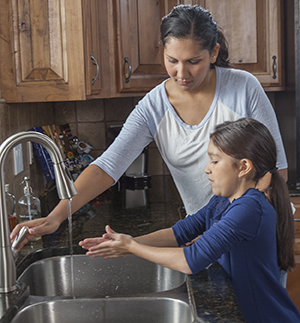E. coli Infection in Children
E. coli is a common bacteria found inside the intestines of humans and animals. It's also found in the environment and in food. Certain types (strains) of E. coli are harmful and can cause severe illness. You or your child can be infected by swallowing food or water that contains these strains of E. coli. Contamination occurs when food or water comes in contact with stool from infected humans and animals. The foods that have been involved with E. coli outbreaks include meat (especially ground beef), sprouts, lettuces, salami, and unpasteurized milk and juice . Events that have live animals near food stalls for people can put children at risk for E. coli infection. These may include county fairs and petting zoos.
What are common symptoms of E. coli infection?
These symptoms can appear 2 to 5 days after infection:
Your child can also be infected and have no symptoms at all.
How is E. coli infection diagnosed?
Your child's healthcare provider will give your child an exam. A stool sample will be needed to check for the presence of E. coli. More than one stool sample may be needed.
How is E. coli infection treated?
-
The illness can last 5 to 10 days.
-
Medicines that kill bacteria (antibiotics) may be prescribed if needed. But most children get better with no medical treatment. In some cases, antibiotic treatment can actually make your child worse. If antibiotics are prescribed, be sure your child finishes all of the medicine.
-
Don’t give your child antidiarrheal medicine unless told to by your child's healthcare provider. It can make the illness last longer and decrease the body’s ability to get rid of E. coli.
-
Give your child plenty of water or a children’s electrolyte solution to drink. This helps prevent fluid loss (dehydration).
-
It may take several weeks for the bacteria to clear from your child’s body even after symptoms have gone away.
When to call your child's healthcare provider
Call your child's healthcare provider if your child:
-
Has severe diarrhea that lasts longer than 2 days.
-
Shows signs of dehydration (very dark or little urine, excessive thirst, dry mouth, no tears when crying, or dizziness).
-
Has blood in the stool.
Note: E. coli can cause a severe complication that occurs most commonly in young children (age 5 and younger) called hemolytic uremic syndrome. This condition destroys platelets and red blood cells, and leads to kidney failure. Take your child to the emergency room immediately if they have any of the following symptoms:
-
Decreased urination
-
Swelling of the feet, hands, or face (from fluid buildup)
-
Seems very tired, slow-moving, or doesn’t respond
-
Cries and can’t be consoled
-
Fever over 100.4° F ( 38°C) , along with other concerning symptoms
-
Seizures
How can E. coli infection be prevented?
 |
| Teach your child to wash hands with soap and warm water to help prevent E. coli infection. |
To prevent your child from passing on E. coli infection:
-
Clean your child’s bottom well when changing diapers. Afterward, wash your hands with soap and water. Do the same for your child.
-
Keep your child home from daycare or school until cleared by your healthcare provider.
To lessen the chances of E. coli infection in the future:
-
Wash your hands with soap and clean, running water often (for at least 20 seconds, rubbing your hands together). Do this before preparing meals or eating food, and after going to the bathroom, cleaning your nose, sneezing, coughing, or handling pets and their waste. Teach your child to do the same.
-
Use a food thermometer when cooking. Cook poultry to at least 165°F (73.8°C). Cook pork, beef, and lamb cuts to at least 145°F (62.7°C). Cook ground meats to at least 160°F (71.1°C).
-
Wash or peel fruits and vegetables before eating.
-
Drink only pasteurized milk, juices, and ciders.
-
Wash cutting boards and utensils with hot water and soap after each use. Clean kitchen counters with bleach or disinfectant.
-
Don’t swallow or drink water from pools, lakes, streams, or rivers. When camping, or traveling outside the country, don't drink or cook with water unless you know it’s safe. If needed, boil water for at least 1 minute(s) before using it. Or, use a portable water filter specially made to remove bacteria. You can also use water purification tablets to kill bacteria in drinking water.
-
If you drink well water, have it tested once a year for germs, including E. coli.
-
When visiting petting zoos or county fairs, bring plenty of hand sanitizer. Make sure you and your child use the handwashing facilities or the hand sanitizer often. Do this especially after touching animals, and before touching food.
Online Medical Reviewer:
Barry Zingman MD
Online Medical Reviewer:
L Renee Watson MSN RN
Online Medical Reviewer:
Rita Sather RN
Date Last Reviewed:
7/1/2022
© 2000-2024 The StayWell Company, LLC. All rights reserved. This information is not intended as a substitute for professional medical care. Always follow your healthcare professional's instructions.